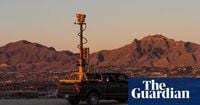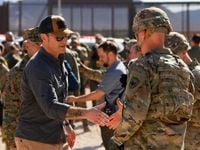The United States has initiated its first criminal prosecutions against migrants accused of illegally entering a newly established military zone along the southern border with Mexico. According to court filings reviewed by various media outlets, approximately 28 individuals have been charged with "violations of security regulations" for breaching this military zone. This charge, while classified as a misdemeanor, carries significant penalties, potentially resulting in fines of up to $100,000 or a year in prison.
These prosecutions stem from a recent decision by the U.S. Department of Defense to create the "New Mexico National Defense Area," which was formally established on April 18, 2025. The area encompasses a 170-mile-long buffer zone, expanding Fort Huachuca to include nearly 110,000 acres of federal land previously managed by the Department of the Interior. This transfer of land is effective for three years and is intended to serve as a deterrent against illegal immigration.
During a visit to the newly designated zone on April 25, Defense Secretary Pete Hegseth emphasized the seriousness of the situation, stating, "Any illegal attempting to enter that zone is entering a military base, a federal, protected area." Hegseth outlined the potential consequences for those who cross into the military zone, noting that individuals who cut fences could face charges for destroying government property, with penalties that could lead to as much as a decade in prison.
Critics of the new military zone, including organizations like the American Civil Liberties Union (ACLU) and Amnesty International, have raised concerns about the implications of using military forces to enforce immigration laws. They argue that the deployment of troops for such purposes represents a dangerous erosion of the constitutional principle that the military should not be policing civilians. Rebecca Sheff, a senior staff attorney with the ACLU, stated, "We don’t want militarized zones where border residents—including U.S. citizens—face potential prosecution for being in the wrong place." Sheff further emphasized that the new policy could inadvertently lead to prosecutions of U.S. citizens simply for entering the military zone.
Historically, various presidential administrations have attempted to limit the flow of asylum seekers by mandating that migrants only apply for refuge at official ports of entry. The Trump administration's recent measures, however, mark a significant escalation in the militarization of the southern border, as it seeks to deter illegal crossings by imposing harsher penalties.
The establishment of the military zone allows U.S. troops to detain migrants without invoking the Insurrection Act of 1807, which permits the deployment of military forces during civil unrest. The last time this act was used was during the 1992 Los Angeles riots. Currently, there are approximately 11,900 U.S. troops stationed at the southern border, a number that has increased significantly since the beginning of the year.
During his visit, Hegseth reiterated that the military would work closely with U.S. Customs and Border Protection (CBP) to enforce the new regulations, stating, "You will be interdicted by U.S. troops and border patrol working together." He also indicated plans to expand military zones at other locations along the border, further solidifying the administration's stance on immigration enforcement.
Hegseth's remarks come amid a broader push by the Trump administration to ramp up its immigration crackdown, which includes the potential for mass deportations of undocumented immigrants. Critics argue that these measures not only threaten the rights of migrants but also undermine the values of dignity and respect that communities along the border hold dear.
According to court documents, migrants detained in the New Mexico National Defense Area face dual charges: one for crossing the U.S.-Mexico border illegally and another for entering a restricted area. This combination of charges reflects a new strategy by the administration to impose stricter penalties on those who attempt to enter the U.S. without documentation.
In light of these developments, experts from the Brennan Center for Justice have voiced concerns about the implications of such presidential overreach, emphasizing the need for Congress and the courts to reassert their roles as checks on executive authority. As tensions rise along the border, the situation continues to evolve, raising important questions about the balance between national security and the protection of civil liberties.
As the legal landscape shifts, many are left wondering how these new policies will affect not only migrants and asylum seekers but also the communities that border the militarized zones. The ACLU and other advocacy groups are closely monitoring the situation, prepared to challenge any actions they believe infringe upon the rights of individuals.
In summary, the initiation of criminal prosecutions against migrants for entering a military zone marks a significant turning point in U.S. immigration policy. As the Trump administration continues to push for stricter enforcement measures, the implications for human rights and civil liberties remain a pressing concern for advocates and legal experts alike.





